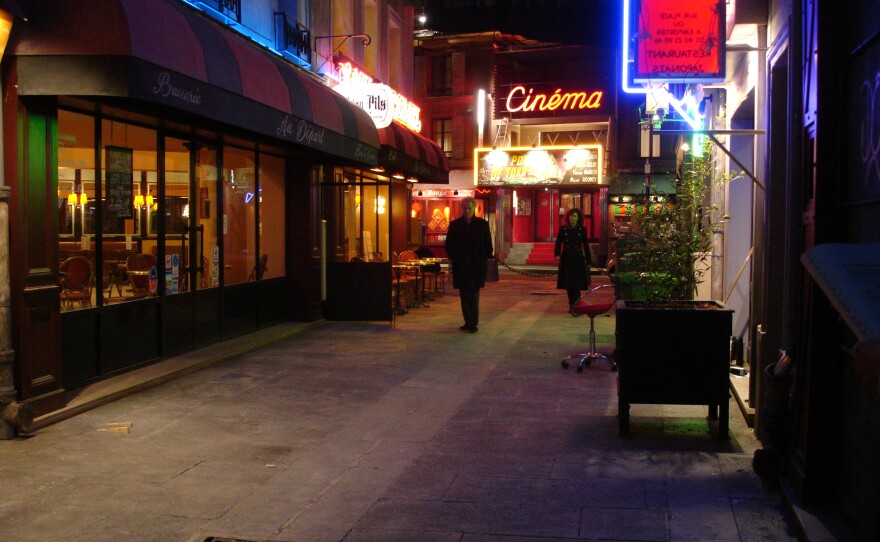We will be talking more in depth about Alain Resnais' "Wild Grass" (opening July 9 at Landmark's Ken Cinema) on the Wednesday KPBS Film Club of the Air, but I just wanted to make sure that people know the film is playing now and well worth seeing.
Those French New Wave filmmakers are truly an amazing group. Even as they enter their 70s and 80s, they continue to make films that are fresh and innovative. Jean-Luc Goddard, Agnes Varda, Claude Charbrol, Jacques Rivette, and Alain Resnais have been making films that feel more innovative than filmmakers less than half their age. It's pretty amazing.

Resnais' latest is a quirky romance called "Wild Grass." Earlier in his career (in films like "Hiroshima Mon Amour" and "Last Year at Marienbad") he dealt with lovers but usually within the context of fragmented narratives in which the lovers were ill-fated. But in "Wild Grass," and in the 1997 "Same Old Song," the French filmmaker reveals a different kind of romantic obsession.
Resnais was looking to adapt a stage play when he came across the novel "L’incident" by French author Christian Gailly. Resnais changed the title to "Wild Grass," because, as he notes in the press kit, "this title seemed to correspond to these characters who follow totally unreasonable impulses, like those seeds that make the most of cracks in the asphalt in the city or in a stone wall in the country and grow where they are the least expected to."
So "Wild Grass" opens with shots of tufts of grass growing in the unlikeliest of places. Then a narrator (Edouard Baer, who has a tendency to get very caught up in his own narration) explains that a chance happening -- a stolen wallet -- leads to an unexpected encounter and to a strange relationship. Marguerite Muir (Sabine Azéma) has a difficult time finding shoes so we follow her feet to a shoe store where, after trying on multiple pairs, she finally finds the perfect ones. But as she leaves the store her purse is stolen. Cut to Georges Palet (André Dussollier) who finds her red wallet. Now he could just turn it in to the police but after examining the ID, he becomes obsessed with the owner of the wallet. Then when Marguerite goes to retrieve the wallet she becomes curious about person who found it. So begins one of the stranger screen romances as Marguerite and Georges engage in a kind of dance as they navigate a relationship that involves stalking, flying, letter writing, slashed tires, missed calls, and obsessive pursuit.

In the "Same Old Song," Resnais employed songs as part of the narrative structure and it was the musicality of Gailly's novel that apparently attracted him to Gailly's work. In the press notes, Resnais says, "What I sensed in the novel, in a musical sense, was a kind of syncopation and improvisation, a skill for variation on ‘standards’. I was also struck by the stubbornness of protagonists Georges Palet and Marguerite Muir. They are incapable of resisting the desire to carry out irrational acts, and display incredible vitality in what we can look on as a headlong rush into confusion."
The course the romance takes feels fresh even though Resnais enjoys referencing old movie cliches and conventions. The characters are older than we usually find in a film romance, and much more unpredictable and impulsive. But in their coming together and pulling apart and circling of each other, we sense something very musical and much like a cinematic dance. Of course Resnais also has a fine pair of actors in the lead roles, Dussollier and Azéma are mature, intelligent, and inspired performers. In less capable hands, these characters could have become ridiculous but in Dussollier's and Azéma's hands the characters create their own reality and come across as surprisingly real despite some extremes in behavior.

Author Gailly says in the press notes, "Monsieur Resnais does not film literature, he composes images that talk to us about something else entirely, about what I don’t know, but it is visible and, in my opinion, that is what the cinema should be." Well it's nice to have an author sum up so beautifully what Resnais does with his films. In "Wild Grass," there is a visual lushness with Resnais often painting with a bold, seductive color palette. The film bursts with a vitality and vibrancy that proves irresistible. Resnais also reveals a still playful style as he toys with film conventions. He gives us a voice over narrator who displays more energy and more engagement in the story than we are accustomed to from such a source. Then Resnais uses music swells and brings up an "Fin" title card to fool us into thinking we've reached the end of his tale. He's slyly toying with us and we enjoy it every step of the way.

"WIld Grass" (in French with English subtitles and rated PG for some thematic material, language and brief smoking) is a refreshing and vibrant work from an old master who still seems to be learning new tricks.
Be listening Wednesday at 10am for the KPBS Film Club of the Air when we'll discuss "Wild Grass."
Companion viewing: "Same Old Song," "Hiroshima Mon Amour," "Last Year at Marienbad"






